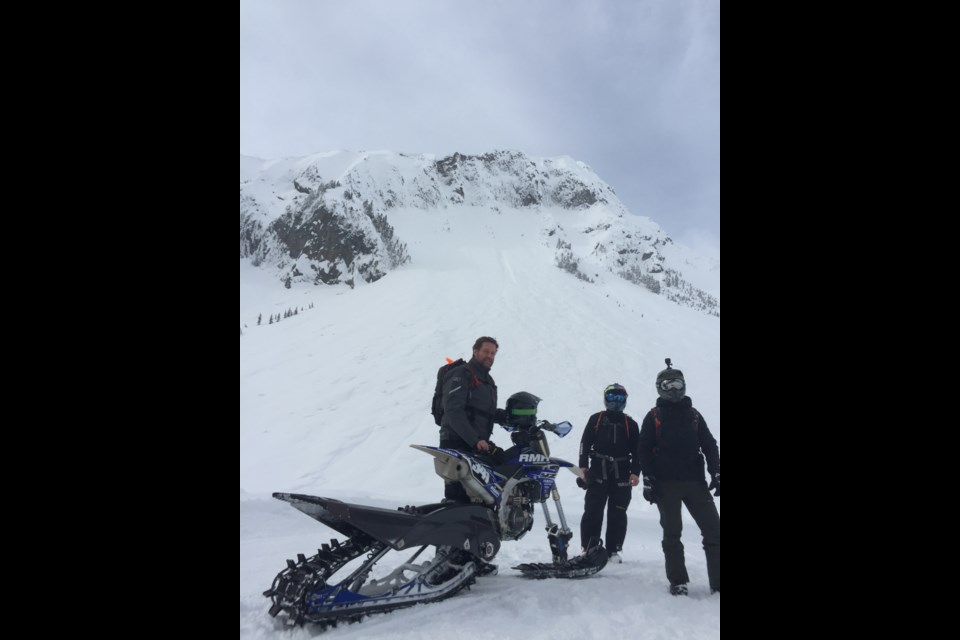Philippe Devos knew it was bad immediately after landing the drop.
“There was certainly some sort of sense of a pop or crack in my back,” he remembered, “and then there was the sensation that I couldn't really move my legs.”
It was February 24, 2020 and Devos, in Whistler on holiday, had spent most of the day on Brandywine Mountain tearing through a few centimetres of fresh snow on a snowbike. Devos had tried snowbiking a few times before, after first getting the chance to demo a machine near his home in Toronto. It was a natural fit for the long-time motorcycle enthusiast.
Devos had already hit the natural terrain feature that afternoon, landing smoothly onto the gently sloped landing below. “I thought ‘That looks like fun.’ I went off the drop; it was fun,” Devos recalled. “I thought ‘Well, this will be the highlight moment of the trip, I should get this on video to show what snowbiking is all about to people back home who don't know it.”
He headed back uphill, turned toward the drop and hit the gas.
This time, the soft snow wasn’t enough to cushion his landing. The impact shattered his T12 vertebra, sending shards into his spinal cord and instantly paralyzing Devos from the waist down—a devastating stroke of bad luck.
“But I always say, after my injury, my luck turned around,” he explained.
Clear skies and open terrain meant a Whistler Search and Rescue helicopter could land directly beside Devos, with its expert crew saving him a painful and dangerous trip down the mountain in a toboggan. It transported him to the Whistler Health Care Centre’s emergency room, where medical staff confirmed his spinal cord injury. An air ambulance brought Devos to Vancouver General Hospital (VGH), where surgeon Dr. Brian Kwon—a Canada Research Chair in spinal cord injuries—happened to be available. Devos found himself laying on Kwon’s operating table the next morning, less than 24 hours after he was stuck laying in the snow with his vertebra in pieces.
“I think if you talk to him, he'd say that [those are] the two things that gave me the best chance of recovery: that I got to the surgery that quickly, and that I got to do the surgery with him,” said Devos. “He is inarguably the best at what he does in Canada, if not the world.”
Even with those heightened odds, full recovery was never a given. Asked whether he’d walk again, Kwon told his patient, “It's possible, but I wouldn't bet on it,” remembered Devos. It was also unclear whether his bladder functions would return.
But confronted with a harsh new reality, Devos’ string of good luck continued, beginning with his interprovincial travel and health insurance’s willingness to cover all necessary costs—including the $40,000 bill for the private air ambulance from –°¿∂ ”∆µ to Toronto, as well as the numerous pieces of specialized equipment he required.
In the days and weeks following his surgery, his bathroom functions improved, as Devos consistently progressed from being able to sit upright on his own and wheel himself through hospital hallways, to moving a toe, then an ankle, then a calf. Still, Devos’ rehabilitation team wouldn’t offer him any guarantees when it came to his recovery.
That is, until April 3, when—just over a month after his injury, with some assistance from his physiotherapist and a set of parallel bars—Devos took his first steps.Afterwards, “I asked [my physiotherapist], I said ‘Does this mean I can finally walk out of here?’ And she said, ‘Yeah, I think so.’ That was the first time she allowed that.”
Devos strolled out of the hospital about a month later, with the aid of a walker.
He’s quick to caution that every spinal cord injury is unique, but admits his recovery is far from typical.He hasn’t been back on a motorcycle or snowbike since the accident, and said he doesn’t know if he ever will. But today, Devos walks without assistance, and is looking forward to more days on his stand-up paddleboard this summer, as well as on the sailboat he and his family purchased over the winter. Devos keeps in touch with Kwon through texts and emails—who is “working to improve techniques and research so that my recovery is not the exception, but that it is the norm,” Devos explained—and makes monthly donations to Whistler SAR; his way of showing gratitude to the volunteers who helped him safely off the mountain.
One thing Devos wasn’t particularly big on even before his accident was celebrating his birthday. “They just come around with time, you don't really have to do anything to get a birthday—just not die, really,” he said with a laugh.
But since his injury, he’s stopped altogether. Instead, Devos and his family celebrate April 3, “which, in our family, we call Kwon-Constand Day—for Dr. Kwon, my surgeon, and for Marissa Constand, my physiotherapist who got me walking again,” he said. “That's the day we celebrate instead of my birthday now, in our house.”
VGH & U–°¿∂ ”∆µ Hospital Foundation and the –°¿∂ ”∆µ Professional Fire Fighters’ Burn Fund is currently in the midst of its 2022 Hometown Heroes Lottery fundraising campaign, an initiative that aims to raise essential funds for specialized adult health services and research at VGH and U–°¿∂ ”∆µ Hospital—like those that helped Devos—including GF Strong Rehab Centre and Burn Fund programs. Tickets, on sale until midnight, July 14, 2022 or until they sell out, offer holders the chance to win one of 3,220 prizes, including the choice of one of nine prize homes throughout –°¿∂ ”∆µ or $2.2 million in tax-free cash. For more information or to purchase tickets, head to the.




